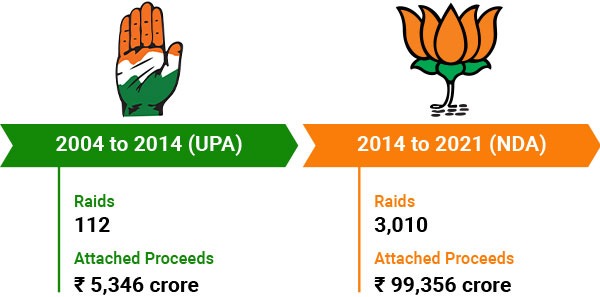
In a controversial decision last week, the Supreme Court upheld the constitutional validity of the amendments to the Prevention of Money Laundering Act (PMLA), 2002. The decision in turn has given more teeth to the government and the Enforcement Directorate (ED) and ratified their powers to issue summons, conduct raids, attach properties, and arrest individuals in money laundering offences.
Over 240 petitions were filed against the amendments by petitioners that include names like Mehbooba Mufti, Anil Deshmukh, and Karti Chidambaram. The petitioners, through their lead lawyer, senior advocate Kapil Sibal, challenged the amendments on the ground that they violated personal liberty, procedures of law, and the constitutional mandate. The Supreme Court’s stamp of approval comes at a crucial time when an increasing number of Opposition leaders are being subjected to raids and arrests by the ED.
The verdict, delivered by the three-judge bench of Justices A M Khanwilkar, Dinesh Maheshwari and C T Ravikumar, noted that money laundering is an offence against the sovereignty and integrity of the country and is no less a heinous offence than the offence of terrorism. It also gave an expansive meaning to the offence of money laundering to include every process and activity, direct or indirect, dealing with the proceeds of the crime. The verdict contradicts the spirit of an earlier judgment passed by the top court only a few weeks earlier, which said that democracy should not give the impression that it was a police state. The 545-page judgment of the Supreme Court repeatedly invokes the “international commitment” behind Parliament’s enactment of the law to curb the menace of laundering of proceeds of crime.
Salient points of the verdict
- The ED can record signed statements and demand the production of documents, at the risk of a penalty. The petitioners argued that the accused are repeatedly summoned by the ED and made to sign statements on the threat of arrest, which essentially gives the ED the powers of a civil court. The top court rejected the submissions saying that it does not amount to compulsion or violation of right against self-incrimination as it is an enquiry, not an investigation.
- The accused need not be given a copy of the Enforcement Case Information Report (ECIR) which details the crime for which he/she is being arrested. The petitioners cited Article 22 of the Constitution under which no person can be arrested without informing him or her of the grounds of the arrest. The court said that an ECIR cannot be equated with a First Information Report (FIR) and it is enough if ED, at the time of arrest, verbally discloses the grounds of such arrest. The court justified that the ECIR was an “internal, departmental document” and revealing its contents before the completion of inquiry or investigation into the proceeds of the crime would have a “deleterious impact” on the final outcome of the case.
- Securing bail for the accused has become nearly impossible as the burden of proof of innocence is on him/her rather than the prosecution. The trial court needs to give bail only if the accused a) proves he is not guilty of money laundering and b) is also not likely to commit any offence while on bail. For an undertrial, who is under custody and with whom the ED has not shared the Enforcement Case Information Report (ECIR), to prove that he is not guilty is a nearly impossible task. Even the undertrial who has already spent half the punishment term in prison cannot seek bail as an "absolute right". The verdict presents a stark contrast with the repeated calls by the Prime Minister, the Chief Justice of India and the Union Law Minister to make justice easy for undertrials which comprise 80 percent of the 6.1 lakh prisoners across jails in India. The Supreme Court has acknowledged the principle of innocence of the accused as a human right but conceded that presumption can be interdicted by a law. With this move, the long-held presumption of being innocent until proven guilty, integral to the basic precepts of justice, has been severely challenged.
There is absolutely no doubt whatsoever that much of the organized crime which includes the drug trade and terrorist acts is funded through proceeds of money laundered illegally. A stringent framework is thus justified for such acts of organized crime. However, the definition of “money laundering”, as endorsed by the Supreme Court includes offences such as fraud, forgery, cheating, kidnapping, and copyright and trademark infringements. This gives the ED sweeping powers to conduct raids and arrest at the whim of the government, to which it reports. The Opposition has accused the government of misusing its powers to silence the voice of dissent, crucial to the healthy functioning of a democracy.

The figures present a highly contrasting picture between the Congress-led UPA rule and BJP-led NDA rule. The ED carried out 3,010 raids and attached proceeds of crime worth Rs. 99,356 crore under PMLA during the 8 years of NDA rule between 2014 and 2021. 888 chargesheets were filed which resulted in the conviction of 23 persons and eventual confiscation of crime proceeds worth Rs. 869 crore. In comparison, there were only 112 raids conducted that resulted in proceeds equating to Rs. 5,346 crore getting attached during the 10-year UPA rule between 2004 and 2014, with a total of 104 chargesheets getting filed. The BJP attributes the increase in searches to ED’s diligence in combating crime while the Opposition leaders and journalists questioning BJP’s governance call it an overreach and abuse of power.
The government of the day, in its submission to the court has maintained that presumption of innocence is not a constitutional guarantee. As a country, India is moving further away from the principle of “Bail and not jail should be the rule”. As aptly articulated by Chief Justice N.V. Ramana, “In our criminal justice system, the process is the punishment.”
TO READ THE FULL ARTICLE

Get full access to the exciting content on The Mirrority by logging in
Support independent journalism
Even the very best of media houses in our country today are yielding to the pressure of click-bait journalism in order to survive. More than ever before, our country needs journalism that is independent, fair and non-pliant to the bureaucracy. Such journalism needs the support of like-minded readers like you to help us survive editorially and financially.
Whether you live in India or India lives inside you, help us continue to produce quality journalism with your contribution.
CONTRIBUTE
